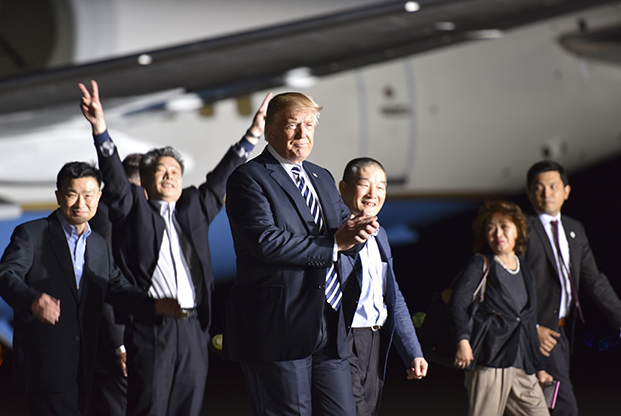
President Donald J. Trump applauds the return of three American detainees released from North Korea upon their arrival to Joint Base Andrews, Md., on May 10, 2018. Air Force photo by Amn. Michael Murphy.
The Trump administration should not trade away military might and deterrence capabilities as part of a potential deal to denuclearize North Korea, researchers in Washington argue ahead of the second meeting between President Trump and North Korean leader Kim Jong-un in Vietnam this week.
Agreeing to pull US troops out of the Korean peninsula would be the worst outcome US and North Korean officials could reach, according to experts at the Center for Strategic and International Studies. They say formally declaring the Korean War over would fuel positive headlines for Trump and Kim but could be dangerous down the road.
“I don’t think we’re going to have a declaration that the US will pull out troops, but I do think a peace declaration is very much on the table,” CSIS Senior Fellow Sue Mi Terry said on a Feb. 21 call with reporters. “It’s logical to assume that if the war is officially over, it could cause all sides, including South Korea and the American public, to eventually question the need for continuation of US military presence in Korea.”
Bruce Klingner, a senior Northeast Asia research fellow at the Heritage Foundation, wrote Feb. 21 even a limited peace declaration could lead to a reduction in US troops without first ensuring North Korea no longer poses a nuclear threat.
North Korea typically views US withdrawal from the peninsula as a piece of total denuclearization, while the US and its allies want to continue America’s strategic presence in the area to deter potential conflicts.
Duyeon Kim, an adjunct senior fellow at the Center for a New American Security, said Feb. 25 denuclearization should entail “a North Korea without nuclear weapons capabilities and a peace treaty that would not alter [the US] alliance with Seoul or military presence on the peninsula.”
With that guarantee, Kim sees peace as an integral part of the path forward.
“Trump and Kim [Jong-un] should announce in writing that their teams will begin negotiating toward the conclusion of a comprehensive denuclearization-peace roadmap by an early date this year,” she wrote. “This roadmap should outline all tradeoffs until North Korea has zero nuclear weapons and a peace regime, underpinned by a peace treaty, is established on the Korean Peninsula.”
Failing to establish a roadmap would allow North Korea to dictate its own terms for and pace of denuclearization, Kim added.
Victor Cha, CSIS’s senior adviser and Korea chair, said on the press call some are worried Trump could again make concessions that undermine allied military power in the Pacific. At the first summit in Singapore last year, the President’s decision to suspend joint military exercises with the South Koreans raised readiness concerns in the defense community.
Continued restrictions on exercises are likely to be part of a future deal, Terry added. But Klingner pushed back on that approach as well.
“Inform Pyongyang that the moratorium on allied exercises has an expiration date,” he wrote. “The cancellation of at least nine military exercises and constraints on additional operations risks degrading allied deterrence and defense capabilities.”
Retired Lt. Gen. Dave Deptula, the head of AFA’s Mitchell Institute for Aerospace Studies, said keeping some of the Air Force’s most advanced assets nearby will encourage North Korean compliance with any agreement to freeze weapons production, settle on a shared definition of denuclearization and plan for future talks.
“While we must give talks a chance, the only thing they really respect is hard power” like the F-35, F-22, and B-2, Deptula said. If military action is needed—rerouting fourth- and fifth-generation platforms from their focus on Russia and China—he believes the US would have to buy additional F-35s, speed B-21 production, and avoid retiring the B-1 and B-2 in the early 2030s as planned.
Deptula added it appears Trump will push to curb new testing of nuclear weapons and their delivery vehicles, the intercontinental ballistic missile. Klingner cautioned against limiting the agreement to cover only ICBMs, saying other types of missiles could still threaten US assets in the region as well as South Korea and Japan.
Experts say the summit needs to lay out concrete next steps with measurable objectives and timelines to have the best chance of success.
“Expect Kim to offer ‘concessions’ that support that [denuclearization] illusion, but that do nothing to actually end his nuclear weapons program,” Evans J.R. Revere, a senior fellow at the Brookings Institution’s Center for East Asia Policy Studies, argued earlier this month. “Expect a politically embattled American President, eager for a win, to agree.”